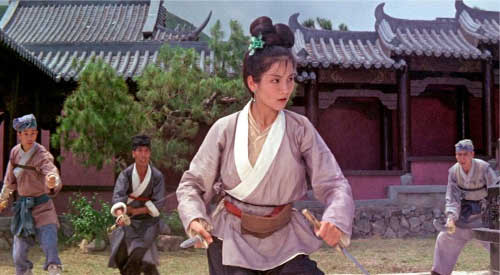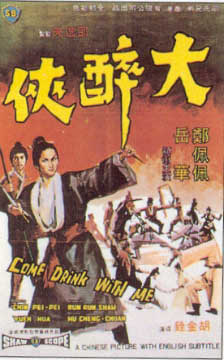

It's a rare film when I
feel that I am watching something of great significance taking place on the
screen. Come Drink with Me directed by King Hu in 1965 certainly made me
feel this way. I was enthralled, immersed and moved by it. It is without
a doubt one of the watershed films in Hong Kong cinema. Working for the Shaw
Brothers, King Hu magically combines many of the cinematic elements that
were to influence HK films for decades to come. It is a wonderful sword fighting
film - clearly influenced by the Japanese Samurai films of the time - and
is full of spectacle, fantasy, drama, evil villains and larger than life
heroes. The main hero is Golden Swallow - one of the first great action heroines
in HK films. Hu often filled his movies with strong female characters - Angela
Mao, Polly Shang Kwan and Hsu Feng - were in some of his later films.
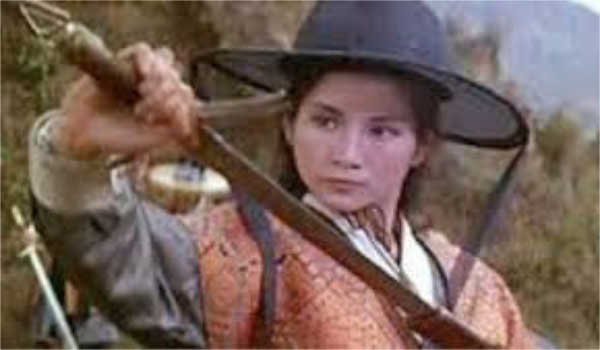
Cheng Pei Pei stars as Golden
Swallow and because of this film and the sequel Golden Swallow (aka Girl
with the Thunderbolt Kick - directed by Chang Cheh) she has become something
of a legend. Kelly Hu's character in Martial Law pays tribute to her by taking
the name Pei Pei. Cheng Pei Pei was not a martial artist, but in fact a dancer
and she moves beautifully through her choreographed sword fights - dispatching
the bad guys with lithe quick thrusts or in a flurry of motion. The film
begins with an attack upon an imperial official and his escorts by a band
of thieves. They kill the escorts and take the official as a hostage and
later demand that their leader be freed from jail or the official will be
executed. Instead, the magistrate sends his daughter Golden Swallow to either
negotiate his release or slay the bandits. The first scene with Pei Pei is
a classic. Hu has an incredible ability to slowly build a scene - layer it
with interesting characters, heightening tensions, sideway glances - all
counter-pointed by a terrific Chinese driven soundtrack.
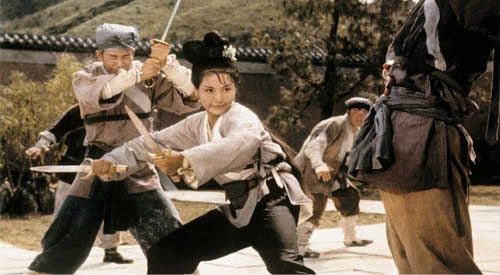
Pei Pei enters an inn (one
of Hu's favorite venues) and sits down at a table to eat. Gradually we realize
that many of the other customers are members of the bandit group and they
slowly surround her, and then discreetly test her skills and then silently
draw their swords. All this time Pei Pei continues as if nothing is awry,
but she misses nothing. Finally the tension breaks and the bandits attack.
Pei Pei is more than ready for them. The film continues in wonderful fashion
as Pei Pei finds an ally in a drunken beggar (Yueh Hua) who turns out to
be much more than he appears. Between the two of them, they take on the bandits
leading to a final climatic fight full of swirling swordswomen, flying arrows,
deadly daggers, flashing swords and dying fighters lying on the field. The
two villians Jade Faced Tiger (Chen Hung-lieh) and Smiling Tiger (Lee Wan-chung)
are two of the more memorable bad guys in film.
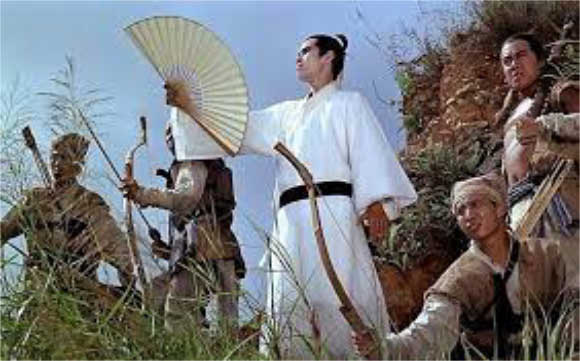
This film and others by King Hu had a huge influence on the HK films that
followed and in particular on Tsui Hark and the fabulous fantasy films he
was to make in the 80's and 90's. Before Hu, sword fighting felt static
but he made it an art form but one with great characters and plots and overlaid
with Chinese culture which was important to him. Everything works here and
was the first in a series of stunning films that he made over the next decade.
